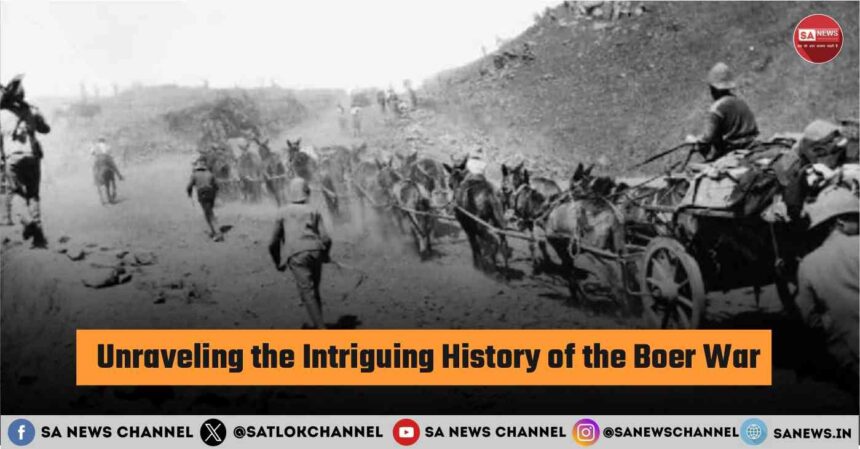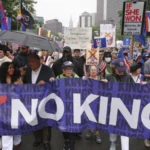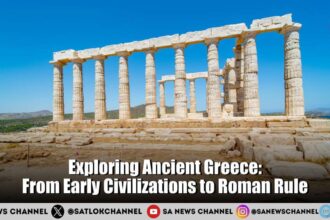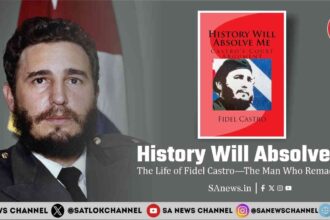The Boer War was a big event in history. It happened in the late 1800s and early 1900s. It was between the British Empire and two Boer states in South Africa.
- History of the Boer War
- The Origins and Causes of the Boer War
- Colonial Tensions Between Boers and British
- The Uncovering of Gold and Diamonds in South Africa
- British Imperial Ambitions in the Region
- Boer War Causes
- Key Players Who Shaped the Conflict
- Boer Leaders: Paul Kruger and Louis Botha
- British Commanders: Lord Roberts and Lord Kitchener
- Indigenous African Populations and Their Involvement
- The First Boer War (1880–1881): A Prelude to Greater Conflict
- The Transvaal Rebellion and Its Causes
- Major Battles and Boer Tactical Advantages
- The Convention of Pretoria and Its Aftermath
- The Complete History of the Boer War (1899–1902)
- The Jameson Raid and Rising Tensions
- Three Distinct Phases of the Second Conflict
- International Reactions and Support
- Significant Battles That Determined the War’s Course
- The Siege of Mafeking and Colonial Defense
- The Battle of Spion Kop: A British Disaster
- The Fall of Pretoria and Conventional Warfare’s End
- Guerrilla Warfare Tactics and British Countermeasures
- The War of Attrition and Its Human Cost
- Concentration Camps and Humanitarian Crisis
- British Internment Policies and Their Implementation
- Conditions, Disease, and Mortality Rates
- Emily Hobhouse’s Exposé and Public Outcry
- The Role of Colonial Forces in the British War Effort
- Imperial Solidarity and Colonial Contributions
- The Treaty of Vereeniging and Post-War Reconstruction
- Peace Negotiations and Boer Surrender
- Terms, Conditions, and Territorial Changes
- Economic and Political Reconstruction
- Conclusion: The Legacy and Long-term Impact of the Boer War
- FAQ
- What were the main causes of the Boer War?
- Who were the key leaders during the Boer War?
- What was the significance of the First Boer War?
- What were the distinct phases of the Second Boer War?
- What was the role of concentration camps during the Boer War?
- How did colonial forces contribute to the British war effort?
- What were the terms of the Treaty of Vereeniging?
- What was the legacy of the Boer War?
History of the Boer War
Many things caused the war. Disputes over land and resources were big reasons. The British wanted to grow their empire too.
This war changed the area a lot. It ended with the British taking over the Boer lands.
Key Takeaways
- The Boer War was a complex conflict with deep-rooted causes.
- The war had significant effects on the region and its people.
- The conflict marked a turning point in the history of South Africa.
- The British Empire’s expansion was a key factor in the war.
- The conflict resulted in the incorporation of the Boer territories.
The Origins and Causes of the Boer War
To understand the Boer War, we must look at colonial politics, economic finds, and big dreams. These things were big in South Africa in the late 1800s.
The war was mainly because of colonial tensions between the Boers and the British. The Boers, mostly Dutch, had their own places in South Africa. The British wanted to take over more of the area.
Colonial Tensions Between Boers and British
These problems started early in the 1800s. The British wanted to control the Cape Colony, which was Dutch. The Great Trek in the 1830s made things worse.
The Uncovering of Gold and Diamonds in South Africa
Gold was found in the Witwatersrand in 1886. Diamonds were found there before that. This made the British very interested in the area. Many British miners came, which made things tense.
| Year | Event | Impact |
| 1886 | Discovery of gold in Witwatersrand | Increased British interest and influx of uitlanders |
| 1867 | Discovery of diamonds | Initial British interest in the region |
British Imperial Ambitions in the Region
The British wanted to control South Africa. They wanted its minerals and important places. This was a big dream for them.
Historian Thomas Pakenham said, “The Jameson Raid in 1895 was a big warning before the war. It showed how much the Boers and British didn’t get along.”
“The Jameson Raid was a fiasco, but it marked the beginning of a new era in South African politics.”
Boer War Causes
These things together led to the Boer War. It was a big deal for South Africa and the British Empire.
Key Players Who Shaped the Conflict
Many important people played big roles in the Boer War. They shaped the war’s path and its end. The war involved leaders from both sides and also affected local African people.
Boer Leaders: Paul Kruger and Louis Botha
Paul Kruger and Louis Botha led the Boer forces. Paul Kruger served as the president of the South African Republic. He was key in starting the war.
British Commanders: Lord Roberts and Lord Kitchener
The British side had leaders like Lord Roberts and Lord Kitchener. Lord Roberts won many battles for the British. He took over important Boer places.
Lord Kitchener came later. He used harsh tactics that hurt the Boers a lot.
Indigenous African Populations and Their Involvement
Local African people were also in the war. They were caught in the middle of the British and Boer fights. Some supported the British, while others backed the Boers.
The war changed their lives and lands a lot.
The First Boer War (1880–1881): A Prelude to Greater Conflict
The First Boer War was a key event in South African history. It happened from 1880 to 1881. The war was about the Boers wanting to be free and rule themselves, mainly in the Transvaal area.
The Transvaal Rebellion and Its Causes
The Transvaal Rebellion was against British rule in South Africa. The Boers, who were Dutch settlers, didn’t want the British to take over. The Boers wanted to be free and fought back.
Major Battles and Boer Tactical Advantages
Important battles were fought, like at Bronkhorstspruit, Laing’s Nek, and Majuba Hill. The Boers used smart tactics, like surprise attacks and hiding in the terrain. They had better guns than the British, who were using old technology.
Also Read: Korea’s Forgotten War: How a Nation Split Changed the World
The Convention of Pretoria and Its Aftermath
The war ended with the Convention of Pretoria in March 1881. This agreement let the Boers govern themselves but under British control. This deal caused more problems as both sides had different views.
The First Boer War was a big step towards the Second Boer War. It showed the big fight between the Boers and the British was coming.
The Complete History of the Boer War (1899–1902)
The Second Boer War was a big fight in South Africa from 1899 to 1902. It had many causes, phases, and reactions from around the world.
The Jameson Raid and Rising Tensions
In 1895, a secret plan called the Jameson Raid happened. It was led by Leander Starr Jameson. He wanted to start a fight in the Transvaal Republic. But it didn’t work, making things worse between the British and the Boers.
Three Distinct Phases of the Second Conflict
The war had three main parts: the Boers winning, the British fighting back, and then guerrilla fighting.
- The first part was when the Boers won, like at Mafeking, Kimberley, and Ladysmith.
- The second part was when the British came back with more troops. They broke the sieges and moved into Boer land.
- The third part was when the Boers started using guerrilla tactics. This made the war last a long time.
International Reactions and Support
Many countries watched the war closely. Some supported the British, while others felt for the Boers.
| Country | Reaction |
| United Kingdom | Supported their own war effort, with troops from Australia, Canada, and New Zealand |
| Netherlands | Sympathized with the Boers because of cultural ties |
| Germany | Was officially neutral, but some people felt for the Boers |
The reactions from around the world show how big and complex the Second Boer War was.
Significant Battles That Determined the War’s Course
The Boer War had many key battles. These battles showed the military plans of the Boers and the British. They also changed how the war went.
The Siege of Mafeking and Colonial Defense
The Siege of Mafeking lasted 217 days, from October 1899 to May 1900. It was a key battle in South Africa. The British, led by Colonel Robert Baden-Powell, freed Mafeking.
The Battle of Spion Kop: A British Disaster
The Battle of Spion Kop was very bloody. It happened in January 1900. The British tried to take a hill but lost badly.
The Fall of Pretoria and Conventional Warfare’s End
The Fall of Pretoria was a big change in June 1900. The British took the Boer capital. This ended traditional fighting and started a long guerrilla war.
| Battle | Date | Outcome |
| Siege of Mafeking | Oct 1899 – May 1900 | British Victory |
| Battle of Spion Kop | Jan 1900 | Boer Victory |
| Fall of Pretoria | June 1900 | British Victory |
These battles show the Boer War was complex. They highlight the challenges faced by both sides.
Guerrilla Warfare Tactics and British Countermeasures
Guerrilla warfare was key in the Boer War. The Boers used new tactics against the British. This was because the British had more soldiers and followed traditional war plans.
Boer Commando Units and Their Effectiveness
The Boers formed commando units. These were fast and knew the land well. They attacked, ambushed, and sabotaged, hurting British supplies and messages.
The Boer commandos were good at hiding in the local people and land. This made them hard for the British to find. Their tactics helped them fight back against the British, even when traditional war seemed to favor the British.
Scorched Earth Policy and Blockhouse System
The British fought back with a scorched earth policy. They destroyed crops, animals, and buildings to take away from the Boers. They also built blockhouses to stop the Boers from moving around.
| British Countermeasure | Purpose | Impact |
| Scorched Earth Policy | Deny resources to Boers | Severe hardship for Boer civilians and fighters |
| Blockhouse System | Restrict Boer movement | Reduced Boer ability to maneuver and resupply |
The War of Attrition and Its Human Cost
The British actions led to a long, hard fight. Both sides lost a lot. The Boers found it hard to keep fighting, and the British paid a big price in money and lives.
Boer civilians suffered a lot. The British put them in camps. Life in these camps was very hard, causing a lot of suffering and death.
Concentration Camps and Humanitarian Crisis
The Boer War left a dark mark with the British concentration camps. These camps were very harsh and many people died there. The British made these camps to keep Boer civilians, like women and kids, away from the Boer fighters.
British Internment Policies and Their Implementation
The British wanted to stop Boer fighters by isolating them. They moved Boer civilians into camps to keep them from helping the fighters. British leaders, like Lord Kitchener, made sure this happened.
“The concentration camps were a tragic consequence of the war, reflecting the extreme measures taken by the British to quell the Boer insurgency.”
Conditions, Disease, and Mortality Rates
The camps were very bad. They were too crowded, dirty, and didn’t have enough food. Many kids died because they were too thin and sick.
Emily Hobhouse’s Exposé and Public Outcry
Emily Hobhouse saw the camps and was very upset. She told everyone about the suffering and deaths there. Her work made people in Britain and other places angry and want change.
The camps during the Boer War are a dark part of British history. They show the bad things that can happen in wars.
The Role of Colonial Forces in the British War Effort
The British war effort got a big boost from colonial forces from Australia, Canada, New Zealand, and India. These groups were key in the British strategy. They helped change the war’s outcome in big ways.
Contributions from Australia, Canada, and New Zealand
Australia, Canada, and New Zealand sent many soldiers to the Boer War. Australia sent over 16,000, Canada more than 7,000, and New Zealand around 6,500. Their help was important for the British army. It also brought the colonies closer together.
Role of the Indian Medical Corps
The Indian Medical Corps was very important in the war. They helped heal wounded soldiers and fought diseases. Their work was very helpful.
Imperial Solidarity and Colonial Contributions
The colonial forces showed imperial solidarity in the Boer War. Their help was not just in fighting. It also showed unity among the British colonies.
| Colony | Number of Troops | Notable Contributions |
| Australia | 16,000+ | Military engagements, mounted infantry |
| Canada | 7,000+ | Troop deployments, logistical support |
| New Zealand | 6,500+ | Mounted rifles, scouting missions |
| India | – | Medical Corps, logistical support |
The Treaty of Vereeniging and Post-War Reconstruction
On May 31, 1902, the Treaty of Vereeniging was signed. It ended the Boer War and started a complex rebuilding process. This treaty was a big change in South African history, ending the fight between the British and the Boers.
Peace Negotiations and Boer Surrender
The talks for the Treaty of Vereeniging were long and hard. Leaders like Louis Botha and Jan Smuts talked with the British, led by Lord Kitchener. They worked hard to find an agreement.
The Boer leaders agreed to stop fighting because of British actions. The British used harsh tactics like the scorched earth policy and concentration camps. These actions hurt the Boer people and made it hard for them to keep fighting.
Terms, Conditions, and Territorial Changes
The Treaty of Vereeniging had important terms. The Boer Republics became part of the British Empire. The Boer leaders agreed to this, and the British promised to help rebuild.
| Terms | Conditions |
| Annexation of Boer Republics | Recognition of British Sovereignty |
| Amnesty for Boer Fighters | Reconstruction Efforts |
| Language and Cultural Rights | Eventual Self-Government |
Economic and Political Reconstruction
After the war, the focus was on rebuilding. The British worked on roads, railways, and towns to help the economy grow. Politically, the treaty was a step towards self-government for the Transvaal and Orange River Colony.
Rebuilding was hard and faced many challenges. But the Treaty of Vereeniging helped set the stage for South Africa’s future.
Conclusion: The Legacy and Long-term Impact of the Boer War
The Boer War lasted from 1899 to 1902. It left a big mark on history. Its effects are seen today in South Africa and around the world.
The war changed how countries relate to each other. The Treaty of Vereeniging started British rule in South Africa. It also caused ongoing racial and ethnic problems.
The war’s tactics, like guerrilla warfare, changed how armies fight. The British’s scorched earth policy also had a big impact on war strategies.
The war’s humanitarian crisis, like the concentration camps, changed how we treat people in war. It led to new rules in international law.
The Boer War’s effects are seen globally. It changed South Africa’s history and military and humanitarian policies worldwide.
FAQ
What were the main causes of the Boer War?
The Boer War was caused by tensions between the Boers and the British. It was also because of gold and diamonds found in South Africa. Plus, the British wanted to expand their empire.
Who were the key leaders during the Boer War?
Important leaders were Paul Kruger and Louis Botha from the Boers. The British had Lord Roberts and Lord Kitchener.
What was the significance of the First Boer War?
The First Boer War was a start to a bigger conflict. It included the Transvaal Rebellion and the Convention of Pretoria.
What were the distinct phases of the Second Boer War?
The Second Boer War had three main parts. First, the Boers won. Then, the British fought back. Lastly, there was guerrilla warfare.
What was the role of concentration camps during the Boer War?
The British made concentration camps. This caused a big problem. Many people died, and it made people very upset.
How did colonial forces contribute to the British war effort?
Forces from Australia, Canada, and New Zealand helped the British. They also had the Indian Medical Corps. This showed unity in the empire.
What were the terms of the Treaty of Vereeniging?
The Treaty of Vereeniging ended the war. The Boers gave up, and the British set rules. This changed the land and started rebuilding.
What was the legacy of the Boer War?
The Boer War changed South Africa, the British Empire, and the world. It had a big impact on history and left a lasting legacy.









